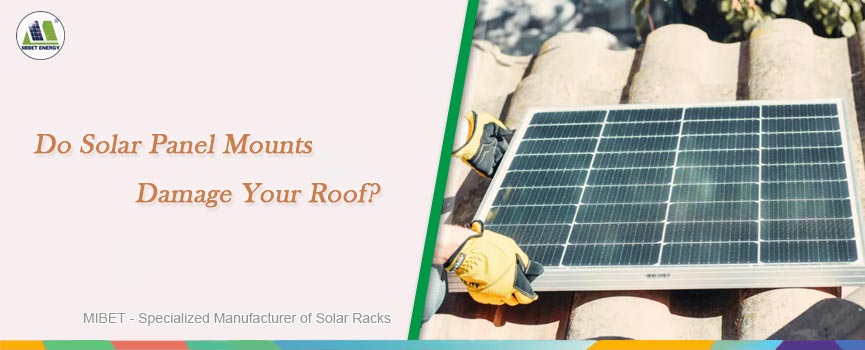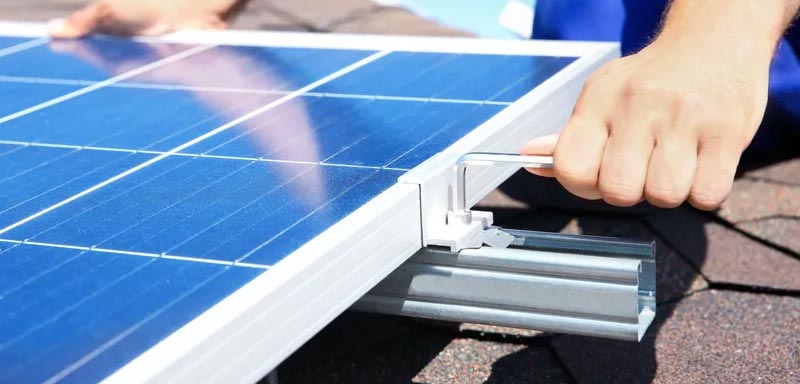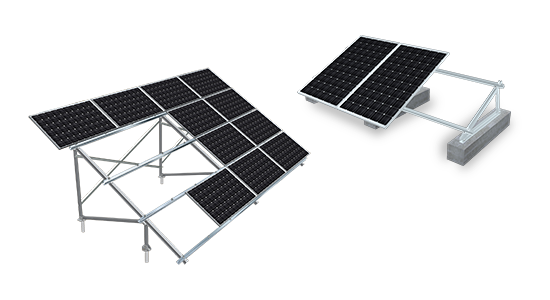Do Solar Panel Mounts Damage Your Roof?

Sustainability in modern buildings is increasingly gaining attention, with many opting for solar panels as a renewable energy source. These panels not only serve as a shield against the elements but also keep your roof cooler, reduce the burden of snow, and prevent the formation of ice dams. Moreover, they contribute to lowering your air conditioning expenses and can extend your roof's lifespan by shielding it from heat damage.
However, you may have some worries about how installing panels could affect the condition of your roof. Solar panels usually last for 30 to 35 years so it's important to make sure they're put in properly and securely. Fortunately, damage to roofs from solar panel installations is very uncommon. This is because professional installers employ careful measures to avoid any leaks or structural harm. If you are considering a rooftop solar system, here are the key factors you should consider.
Do Solar Panels Cause Roof Damage?
The common belief that solar panel installation inevitably harms roofs is unfounded. In fact, when carried out by experienced professionals, the risk of damaging your roof is minimal. Here's why:
Preventative Assessments
Before installing solar panels, professionals meticulously inspect your roof to verify its condition. They resolve any existing problems to ensure a secure installation. Furthermore, throughout the installation process, they employ various protective measures, such as flashings and sealants, to preserve the roof's integrity and avert water penetration.
Even Weight Distribution
Solar panels are not merely tossed onto a roof. Instead, they are carefully positioned and securely fastened to distribute their weight evenly across the roof structure, reducing the likelihood of any damage.
Enhanced Protection for Roofing Material
Interestingly, the sections of your roof under the solar panels gain additional protection. The panels act as a barrier against environmental factors like the sun's intense UV rays, heavy rain, and flying debris, which can extend the material's life.
The safety and efficacy of mounting solar panels on roofs have undergone extensive research, and the findings are positive.
● Thorough Testing and Compliance: Solar panels and their mounting systems are subjected to stringent testing to adhere to rigorous industry standards. This certifies their durability against diverse weather conditions such as strong winds, heavy snowfall, and severe temperatures.
● Low Frequency of Complications: Statistical evidence indicates that issues with roof installations of solar panels are uncommon. When problems do arise, they typically stem from faulty installation procedures.
● Continuous Support and Warranties: Renowned solar installation firms provide comprehensive warranties and continuous support. This not only reassures homeowners but also guarantees that any issues are managed swiftly and with expertise.
Typical Roof Damage from Solar Panel Mounts
While solar panels provide substantial renewable energy and savings on electricity bills for a home, they aren't flawless, especially when improperly installed on residential roofs. Hastily completed installations, improper fittings, and substandard workmanship can lead to both cosmetic and structural damage to a roof and home.
To reduce the risk of damage from solar installations, it is important to carefully select your installer and steer clear of companies that may be pushing for a quick sale under deceptive pretenses. Always thoroughly review the contract before signing, paying special attention to provisions related to potential roof damage from the solar panels.
Roof Tile and Shingle Damage
When mounting solar panels, installers need to select the appropriate racking system based on your roofing materials. For instance, flammable materials like wood shingles typically do not safely support solar panels, but there are specific mounting systems tailored for more common roofing types such as asphalt shingles or clay tiles.
For roofs made of clay, slate, or similar durable materials, small "tile hooks" are often used to avoid drilling directly into the roof. However, these hooks can still increase the weight on a tile, potentially leading to breakage or compromising the roof's waterproof integrity.
Structural Concerns
It's crucial that roofs are evaluated to ensure they can support the weight of a solar panel system before installation begins. Failure to do this, particularly by an inexperienced installer, might result in structural issues such as sinking, collapsed ceilings, and even snapped beams, which could have severe consequences.
Wiring and Fire Risks
Furthermore, if the wiring is not properly designed, installed, and safeguarded in compliance with building and electrical codes, there is a small but serious risk of fire. Such incidents, though rare, can lead to significant financial loss and pose serious safety hazards.
How to Reduce the Risk of Roof Damage

Negligently handled roof penetrations, poorly assembled racking systems, and improperly wired solar arrays pose significant risks to your roof's integrity. To effectively minimize the risk of roof damage, you should engage an experienced and fully licensed solar installer. They will utilize the right materials and techniques to mount the panels securely.
Moreover, enhancing the security of your installation by applying double layers of butyl tape on any roofing penetrations can significantly reduce the likelihood of leaks, offering you added reassurance.
Do Solar Panels Offer Protection for Your Roof?
Solar panels are notably robust and serve as a protective layer for your roof against harsh weather, direct sunlight, and other environmental wear and tear. These environmental elements play a significant role in the deterioration of roofing materials.
The sun's harsh rays can be particularly damaging to a roof. Over several decades, roof shingles may become bleached and brittle due to prolonged exposure to sunlight. Once they sustain significant damage, replacement becomes necessary.
By shading the shingles, solar panels mitigate this sun damage. Moreover, the gap between the panels and the roof facilitates air circulation, creating a cooling effect that can help reduce your air conditioning costs.
Additionally, some homeowners opt to install their solar panels as a carport. This solar carport arrangement not only shields your vehicle but also generates electricity for your home. It's an excellent solution if your home lacks sufficient roof space or if you do not have access to a garage.
How Are Solar Panels Installed on Your Roof?
You may naturally worry about potential roof damage when considering solar panel installation. Placing solar racking and panels alters a crucial aspect of your home's structure, and other parts of the installation process could also jeopardize your roof if not handled properly.
A primary concern for many homeowners is the necessity to drill holes in the roof to anchor the racks that will support the panels. These holes, required for securing the boards with lag bolts that withstand extreme weather, vary in size and depth depending on your roof's material.
The idea of drilling into your roof might seem daunting. However, solar installers employ several safety measures to ensure your roof remains leak-free and structurally sound. To prevent water ingress around the bolt fixtures, installers use flashing—a metal or plastic cover that fits beneath existing roof tiles, sealed with tar or a similar substance. Additionally, the area around the lag bolt is filled with sealant to further protect against water seepage.
Another concern might be the additional weight solar panels add to your roof. Fortunately, the structural integrity of your roof is unlikely to be compromised by the weight of 20-30 solar panels, as most roofs are built to support much more weight. Additionally, there's no need to worry about snow accumulation, solar panels are typically installed at an angle that allows snow to slide off effortlessly.
Parting Words
Investing in panels can be a smart choice but its essential not to rush into it. If you have any concerns about your roofs condition it's best to discuss them with the installer or contractor before proceeding with installation. When solar panels are installed correctly, you can rest assured that your roof will not sustain any damage.


